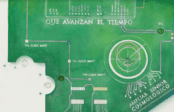[dropcap style=”font-size:100px; color:#992211;”]F[/dropcap]uzzy logic and the organic creative matrix, always the felix culpa of the clumsy human, and the intuitive flaw that machine intelligence covets beyond all.
Or so our science-fiction would have us believe. A recurrent motif – the perfection of mechanisms, so efficient yet so sterile, yearning for the ability to exist outside the rules – to make an honest mistake.
Mind you, they probably never tried to sort out their tax returns with a shoddy calculator from a Chinese junk shop.
A common assumption in the cognitive sciences is that thinking consists of following sets of rules (as it does in a computer). A recent research paper published in Elsevier journal Cognition argues that unlike digital computers, which are designed to follow rules, the computations performed by the neural networks that make up our brain are inherently context dependent.
People sometimes make seemingly strange mistakes like thinking that 798 is an odd number despite knowing how to identify odd and even numbers.Mistakes like this one can be dismissed as carelessness.  The experiments described in this paper—that asked people to classify numbers, shapes, and people into simple categories like evens, triangles, and grandmothers—provide exhaustive evidence that such errors are actually endemic to human cognition, and are far more common than people imagine. The errors made in the various experiments were made by adults varying in age, level of formal education, and were are observed in both American and Indian participants.
The experiments described in this paper—that asked people to classify numbers, shapes, and people into simple categories like evens, triangles, and grandmothers—provide exhaustive evidence that such errors are actually endemic to human cognition, and are far more common than people imagine. The errors made in the various experiments were made by adults varying in age, level of formal education, and were are observed in both American and Indian participants.
Author of the paper, Gary Lupyan Assistant Professor of Psychology, University of Wisconsin, USA, argues that the reason people mistake 798 to be an odd number is that—even though they know that only the last digit matters, they can’t help but also process the other digits, which in this case are odd. This makes the whole number—798—seem “almost” odd, and to some people, actually odd. Such gradedness and context dependence demonstrates just how difficult it is for some people to following strict rules and definitions.
Behavioral flexibility
“This input-sensitivity is critical for obtaining the enormous behavioral flexibility that humans have, but may come at the cost to the ability to perform certain kinds of formal computations. More broadly, the results tell us that the metaphor of the brain as a digital computer running formal algorithms, is seriously misleading,” explains Lupyan.
The question of why people make systematic errors on such seemingly simple problems is also highly relevant for education. Educators for a long time have been uninterested in understanding why children make certain errors, focussing only on bringing them to the right answer. However, although some errors may reflect confusion or inattention, a certain class of errors, actually have a much deeper source and tell us something essential about the human brain.
“Although following simple rules is surprisingly difficult, some people excel at this, and as a society we have invented devices that are capable of blindingly fast and perfectly accurate formal computations (this is what computers were made to do, after all). So the real question we are left with is not why people sometimes mistake 798 for an odd number, but how people ever transcend these limitations, which appear to be inherent to how neurons compute,” Lupyan concludes.
Source: Elsevier
Photo: Kailas Trebuchet

Some of the news that we find inspiring, diverting, wrong or so very right.




















